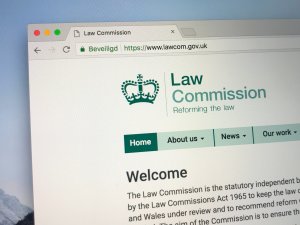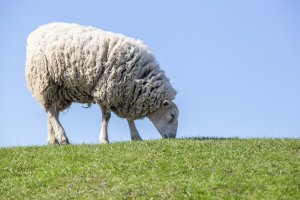Millions of animals are suffering unnecessarily by being slaughtered without stunning to meet religious demands.
That's why we campaign to end religious exemptions to animal welfare laws.
Animal welfare law requires animals to be stunned before slaughter to minimise their pain, suffering and distress. The only exemption is for Jewish and Muslim communities to meet kosher and halal religious dietary preferences.
The scientific consensus is clear that it is more humane to stun an animal prior to slaughter. The slaughter of animals without pre-stunning is permitted in the UK despite a recommendation by the government's own advisory body, the Farm Animal Welfare Council (FAWC), that the practice should be banned. FAWC concluded that animals slaughtered without pre-stunning are likely to experience "very significant pain and distress".
RSPCA, Compassion in World Farming and the British Veterinary Association all support an end to non-stun slaughter to improve animal welfare at the time of death.
- 70% of Brits think stunning animals before slaughtering them is more ethical.
- 72% of the population think food produced from religious non-stun slaughter methods should be clearly labelled.
We support the right to religious freedom. But this is not an absolute right. Religious exemptions shouldn't be made to laws meant to prevent unnecessary animal cruelty.
Take action!
1. Write to your MP
Ask your MP to end the religious exemption that allows animals to be slaughtered without pre-stunning.
2. Share your story
Tell us why you support this campaign, and how you are personally affected by the issue. You can also let us know if you would like assistance with a particular issue.
3. Join the National Secular Society
Become a member of the National Secular Society today! Together, we can separate religion and state for greater freedom and fairness.
Latest updates
Religious privilege causing injustice, NSS tells Law Commission
Posted: Wed, 4 Aug 2021 14:23
The National Secular Society has argued that religious privilege creates inconsistencies and unfairness in laws on education, charity, health and animal welfare in response to a consultation.
The NSS has submitted evidence on these issues to the Law Commission, which has sought views on what should be included in its latest programme of recommended legal reforms.
The commission is a statutory independent body that keeps the law of England and Wales under review and recommends reform where it judges that it's needed.
NSS recommendations
The NSS said the commission should consider:
- Laws requiring collective worship in schools.
- The provision in charity law which makes 'the advancement of religion' a charitable purpose in its own right.
- The lack of effective protection for boys in laws on genital cutting.
- The religious exemption to animal welfare laws that allows non-stun slaughter.
- Assisted dying law.
Law on collective worship
Sections 70 and 71 of the School Standards and Framework Act 1998 require that all state-funded schools in England and Wales "shall on each school day take part in an act of collective worship".
Even in schools with no religious designation, the worship must be "wholly or mainly of a Christian character".
The NSS's submission said this law was incompatible with human rights laws and the principle of equality, and opened the door to inappropriate external evangelism in schools.
Charity law
In laws on charity throughout the UK, 'the advancement of religion' is a recognised charitable purpose in its own right.
The NSS's submission said removing this would ensure greater fairness and mitigate the damage that harmful religious organisations cause.
The NSS made the case for removing 'the advancement of religion' as a charitable purpose in a report, For the Public Benefit?, published in 2019.
Religious organisations would still be able to register for charitable status under another recognised charitable purpose, as many already do.
Genital cutting
The NSS's submission called on the commission to consider the disparity between the protections afforded to boys and girls regarding autonomy over their genitals.
It noted that boys are not given explicit protection from non-consensual, medically unnecessary circumcision or other modifications to their genitals.
It said this was incompatible with human rights law and left many at risk of serious harm.
Animal welfare
The society highlighted the religious exemption from animal welfare laws that allows animals to be slaughtered without stunning according to Jewish and Muslim rites.
There is widespread consensus among veterinary and animal welfare groups that it's more humane to stun an animal before slaughter than not to do so.
The NSS argues for the repeal of the religious exemption, and for the labelling of meat from animals subject to non-stun slaughter while the exemption remains in place.
Assisted dying law
The NSS also called on the commission to draft a legal framework for assisted dying, to guide potential legislation.
The society said a disproportionate level of influence is granted to religious groups in debates on assisted dying, and argued that the views of the general public, professionals and relevant organisations should be fairly reflected at policy level.
It said a framework could help to guide the government into formulating compassionate and safe legislation to allow for assisted dying under certain circumstances.
NSS comment
NSS head of policy and research Megan Manson said: "Our reforms identify several significant ways in which religious privilege within the law causes inequality, injustice and harm.
"Deference to religion has helped to create outdated, unfair and often unnecessarily complex laws in these areas. We hope the Law Commission will consider our recommendations as it outlines its next programme for reform."
About the Law Commission's review
- The Law Commission undertakes a public consultation every few years, with a view to submitting a draft programme of law reform to the lord chancellor.
- This is the commission's 14th programme of reform. The 13th was submitted in late 2017.
Image: Jarretera / Shutterstock.com.
Consider labelling laws for non-stun meat, says government committee
Posted: Thu, 28 Jan 2021 15:07
Changes in law are needed to ensure meat from non-stun slaughter only reaches religious markets and not general consumers, a government committee has said.
The Animal Welfare Committee (AWC) has recommended a series of changes to religious non-stun slaughter regulations in order to reduce animal suffering.
The recommendations were made in a review on slaughter regulations published by the Department for Environment, Food and Rural Affairs (Defra) this week. The review aimed to assess the effectiveness of the law in protecting animal welfare at slaughter.
The AWC advises Defra and the Scottish and Welsh governments on the welfare of animals.
It recommended "tightening the intention that meat from non-stun religious slaughter be destined for religious markets and not the general consumer".
This "might also bring in" a requirement to label meat from non-stun slaughter, in addition to "supply and demand requirements".
The National Secular Society argues for such measures to be put in place to protect consumer rights and animal welfare while religious non-stun slaughter is permitted.
In 2018 NSS research found that meat from animals which have not been stunned before slaughter is widespread in UK supermarkets.
The AWC also recommended that animals that do not become unconscious after their necks are cut should be subject to a "post cut intervention stun" to reduce the time of suffering.
It also recommended improving the effectiveness of stunning techniques specific to halal slaughter.
Concerns from animal welfare groups
UK law requires that animals are stunned before slaughter, with an exemption for kosher or halal meat to meet Jewish and Muslim religious dietary preferences. This exemption has been criticised by animal welfare groups for causing unnecessary suffering.
The RSPCA, Compassion in World Farming, the British Veterinary Association and the Humane Slaughter Association were among stakeholders consulted by Defra that raised animal welfare concerns regarding non-stun slaughter.
The review said a "number of stakeholders" reiterated "long held views that slaughter without stunning should be banned".
In the absence of a ban, stakeholders called for several measures which the NSS has also recently argued for:
- Introducing "method of slaughter labelling".
- Ensuring the supply of non-stun meat does not exceed local demand and ending the export of meat from non-stunned animals.
- Providing greater transparency of data regarding non-stun slaughter.
The review noted that the percentage of sheep slaughtered without stunning increased from 10% in 2011 to 25% in 2018. The percentage of poultry slaughtered without stunning increased from four per cent to 10% in the same period.
NSS comment
NSS head of research and policy Megan Manson said: "The government should take heed of the AWC's recommendations and introduce compulsory labelling for meat products that clearly indicate whether they came from non-stun slaughter.
"While exemptions permitting religious non-stun slaughter remain in place, labelling is the only way to ensure consumers can choose to avoid non-stun meat.
"The government should also note calls from stakeholders in its review to ban all forms of non-stun slaughter. Religious freedom is a qualified right, and it should be limited where it causes unnecessary suffering to animals."
Image by Erik Karits from Pixabay.




